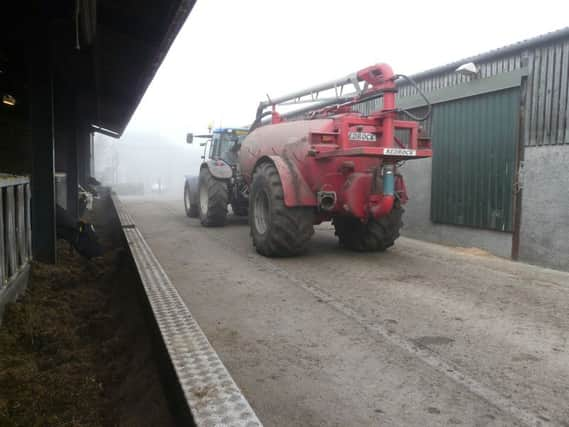DAERA advice ahead of slurry closed period


A spokesman said: “Midnight on the 15 October marks the start of the closed period for spreading organic manure on farms.
“We are acutely aware, that the recent weather conditions have been impacting significantly on the agricultural sector and it is turning out to be a very challenging period for the farming community. The Department, including the Northern Ireland Environment Agency (NIEA), is very sensitive to the predicament in which farmers finds themselves this year.
Advertisement
Advertisement
“The closed period prohibits organic manures, including slurry, poultry litter, sewage sludge and abattoir waste, from being spread from 15 October to 31 January. Farmyard manure must not be applied from midnight 31 October to 31 January. These periods represent the time when the risk of nutrient leaching is at its highest and there is little or no plant growth. Ultimately, the aim of the closed period is to protect water courses from pollution.
“All farmers are required to have at least 22 weeks slurry/manure storage for their livestock enterprises. Pigs and poultry enterprises require a minimum of 26 weeks. Having enough tank capacity gives the ability to store organic manure until the closed period has ended and have flexibility in the timing of spreading if conditions are unfavourable in early spring.
“Farmers should always seek to empty tanks and middens to maximise storage capacity as winter approaches.”
The spokesman said the Department recognises the problems presented by the recent wet conditions.
Advertisement
Advertisement
He added: “Recent heavy rainfall in some area has resulted in wet ground conditions which in turn has led to the early housing of animals. These wet ground conditions have also created difficulties for machinery operations, delaying silage and crop harvesting and the subsequent emptying of slurry tanks before the deadline for the closed period.
“However under exceptional circumstances, beyond the control of and not foreseeable by an individual farmer, a limited amount of slurry can be spread during the closed period. If slurry must be spread during this time, evidence should be available to demonstrate to NIEA that all reasonable steps were taken to manage the situation, and that there was no alternative.
“If slurry has to be spread under exceptional circumstances, it should be on low-risk land and all usual spreading conditions followed. Tanks should not be emptied. Only enough slurry should be spread to leave adequate storage for the remainder to the closed period.”
If farmers have concerns they are advised to contact DAERA on 0300 200 7842 or their local farming organisation.
Advertisement
Advertisement
Detailed guidance can be found about the Nitrates Action Programme for 2015 –2018 online at http://www.daera-ni.gov.uk/publications/2015-2018-nitrates-action-programme-and-phosphorus-regulations-and-associated-documents.